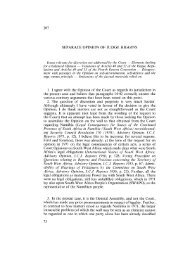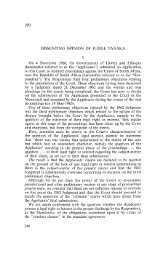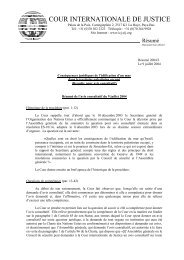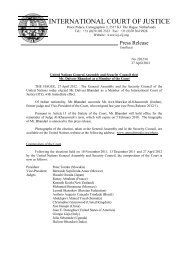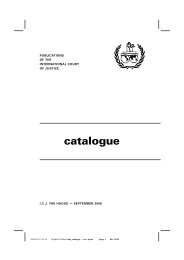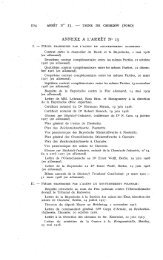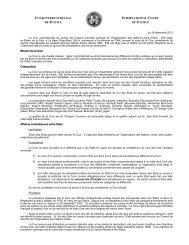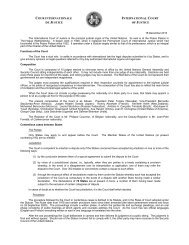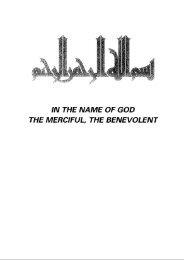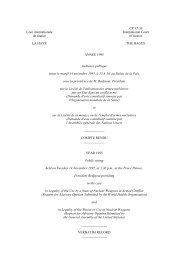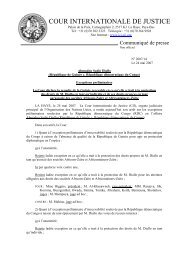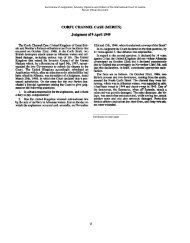botswana/namibia - Cour international de Justice
botswana/namibia - Cour international de Justice
botswana/namibia - Cour international de Justice
Create successful ePaper yourself
Turn your PDF publications into a flip-book with our unique Google optimized e-Paper software.
748. At this point the South African Government obtained legal advice and the outcome is<br />
contained in a letter from the Secretary of <strong>Justice</strong> to the Secretary for External Affairs, dated<br />
12 June 1948. The conclusions reached were as follows:<br />
"The joint report submitted to us gives valuable evi<strong>de</strong>nce to support a claim by the Union, as<br />
Mandatory Power, to Kasikili Island on the ground of prescription, if it should be established<br />
that the northern waterway of the Chobe River would otherwise have formed the boundary.<br />
The evi<strong>de</strong>nce would be substantially complete if it could be shown that, un<strong>de</strong>r German rule<br />
over South-West Africa, administrative acts were performed on the island, and that such acts<br />
were continued un<strong>de</strong>r the mandatory rule without objection on the part of the Bechuanaland<br />
authorities. For instance, do tribesmen on Kasikili Island pay rates in respect of any trust fund<br />
established un<strong>de</strong>r Proclamation No. 27 of 1930?<br />
The whole question is an appropriate one for negotiation between the Union and<br />
Bechuanaland. It may be advisable to appoint a joint inter-territorial commission to<br />
investigate further a possible change in the main course of the Chobe River and to gather<br />
evi<strong>de</strong>nce of the use of sovereign rights over the island. If, of course, it could be ascertained<br />
that the main channel of the river was south of the island when the Treaty was conclu<strong>de</strong>d, the<br />
question of prescription would not arise." (Namibia Memorial, Annex 62)<br />
749. When this letter is read as a whole it is clear that its premiss is that the main channel is<br />
the northern channel, and the consequence is a recommendation to <strong>de</strong>velop a claim 'on the<br />
ground of prescription'. It may be noted that Namibia has not produced any evi<strong>de</strong>nce that<br />
anyone on the island paid rates by virtue of Proclamation No. 27 of 1930.<br />
750. In any event at this stage correspon<strong>de</strong>nce was initiated by South Africa with the British<br />
Government. The Prime Minister's Office in Pretoria wrote to the British High Commissioner<br />
(representing the Bechuanaland Protectorate) on 14 October 1948. The Union Government<br />
admitted that the northern channel was the main channel and stated that:<br />
"As there would appear to be no conflict of interests it should be possible to come to an<br />
arrangement which is mutually satisfactory". (Botswana Memorial, Annex 23).<br />
751. The interim response to this letter, from the High Commissioner's Office, was as follows:<br />
"With reference to your letter No. P.M. 1/18/11 of the 14th October about the boundary<br />
between the Bechuanaland Protectorate and the Eastern Caprivi Zipfel, I am directed by the<br />
High Commissioner for Basutoland, the Bechuanaland Protectorate and Swaziland to inform<br />
you that the Resi<strong>de</strong>nt Commissioner of the Bechuanaland Protectorate has directed the<br />
Assistant District Commissioner, Kasane, that tribesmen of the Caprivi Zipfel should be<br />
allowed to cultivate land on Kasikili Island, if they wish to do so, un<strong>de</strong>r an annual renewable<br />
permit.<br />
2. The High Commissioner trusts that this arrangement will prove satisfactory to the<br />
authorities in the Union." (Letter dated 4 November 1948; Botswana Memorial, Annex 24).<br />
752. This letter indicates, in very clear terms, the view taken by the British si<strong>de</strong> of the legal<br />
status quo. The Memorial of Namibia un<strong>de</strong>rlines this when it makes an unconvincing attempt<br />
to put a gloss on the document:



